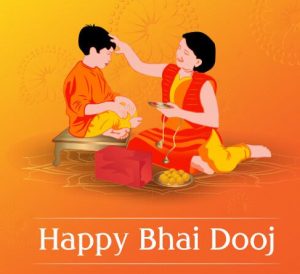Calendar
| Sun | Mon | Tue | Wed | Thu | Fri | Sat |
|---|---|---|---|---|---|---|
| GOVARDHAN PUJA (ANNAKUT) GOVARDHAN PUJA (ANNAKUT) Nov 1 all-day 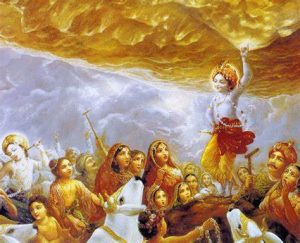 The fourth day of Diwali: Padwa & Govardhan Puja On this day, Govardhan Pooja is performed. Many thousands of years ago, Lord Krishna caused the people of Vraja to perform... | ||||||
| Sunday Bhajan and Satsang 11:30 am Sunday Bhajan and Satsang Nov 3 @ 11:30 am – 1:00 pm  Every Sunday, we have SATSANG (Bhajans, kirtans, Kathas etc.) From 11:30 AM – 01:00 PM followed by Aarti and Prasadam (Lunch) | ||||||
| Sunday Bhajan and Satsang 11:30 am Sunday Bhajan and Satsang Nov 10 @ 11:30 am – 1:00 pm  Every Sunday, we have SATSANG (Bhajans, kirtans, Kathas etc.) From 11:30 AM – 01:00 PM followed by Aarti and Prasadam (Lunch) | ||||||
| TULASI VIVAH TEMPLE CELEBRATION 11:00 am TULASI VIVAH TEMPLE CELEBRATION Nov 17 @ 11:00 am – 2:00 pm 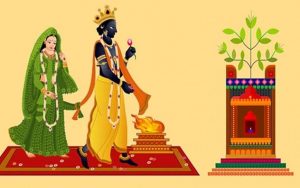 Tulasi Vivah – TEMPLE CELEBRATION ON SUNDAY Tulsi Puja plays a very significant role for Hindus. It is believed that on this day, Lord Vishnu married Goddess Tulsi in the... Sunday Bhajan and Satsang 11:30 am Sunday Bhajan and Satsang Nov 17 @ 11:30 am – 1:00 pm  Every Sunday, we have SATSANG (Bhajans, kirtans, Kathas etc.) From 11:30 AM – 01:00 PM followed by Aarti and Prasadam (Lunch) | DURGA MATA KI CHOWKI 5:00 pm DURGA MATA KI CHOWKI Nov 23 @ 5:00 pm – 10:00 pm 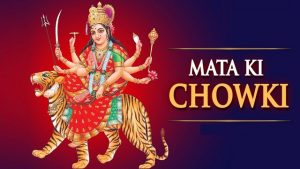 If you would like to host the Mata Ki Chowki at Shree Radhey Shyam Temple, Contact : Raja Sharma 708-822-6656 Maa Durga is revered as the Mother Goddess among the Hindu... | |||||
| Sunday Bhajan and Satsang 11:30 am Sunday Bhajan and Satsang Nov 24 @ 11:30 am – 1:00 pm  Every Sunday, we have SATSANG (Bhajans, kirtans, Kathas etc.) From 11:30 AM – 01:00 PM followed by Aarti and Prasadam (Lunch) |
Happy Father’s Day
Father’s Day celebration is observed to honor fathers, father-like figures and paternal bonds around the world. Children and individuals showcase their love and affection to their fathers and present them with gifts and cards.
Raksha Bandhan or Rakhi (The Thread of Sibling Love) is a special occasion to celebrate this “Sibling Love” bonding by tying a holy thread around the wrist. This thread, which pulsates with sisterly love and sublime sentiments, is rightly called the Rakhi since it means “a bond of protection,” and Raksha Bandhan signifies that the strong must protect the weak from all that’s evil.
The ritual is observed on the full moon day of the Hindu month of Shravan, on which sisters tie the sacred Rakhi string on their brothers’ right wrists, and pray for their long lives. Rakhis are ideally made of silk with gold and silver threads, beautifully crafted embroidered sequins, and studded with semi-precious stones.

The Krishna Janmashtami festival marks the birth of Krishna, one of the most popular Gods in the Hindu pantheon.
Krishna is perceived by most Hindus to be an avatar (incarnation) of Vishnu, who is regarded as the highest avatar. It is believed that all other deities are manifestations of him. Krishna is considered to be a warrior, hero, teacher and philosopher by Hindus.
Krishna’s birthday is celebrated eight days after Raksha Bandhan in the month of Sravana and celebrations are spread over two days.The first day is called Krishan Ashtami or Gokul Ashtami. The second day is known as Kaal Ashtami or more popularly Janam Ashtami.
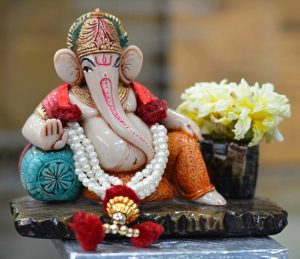
Ganesh Chaturthi is celebrated as birth anniversary of Lord Ganesh. On Ganesh Chaturthi, Lord Ganesh is worshipped as the god of wisdom, prosperity and good fortune. It is believed that Lord Ganesh was born during Shukla Paksha of Bhadrapada month. Currently Ganesh Chaturthi day falls in month of August or September in English calendar.
The Ganeshotsav, the festivity of Ganesh Chaturthi, ends after 10 days on Anant Chaturdashi which is also known as Ganesh Visarjan day. On Anant Chaturdashi, devotees immerse idol of Lord Ganesh in water body after a gala street procession.
Ganesh Visarjana Puja and Visaraja
Followed by Arti and Prasad.
Shradh or Pitru Paksha is a period when Hindus remember their ancestors by offering prayers. ‘Shradh’ is a way of expressing heartfelt gratitude towards parents who are no more, for having helped them be what they are today. According to scriptures, rituals performed during ‘shradh’ bring peace to the departed.
‘Pitru Paksha’ is the period from ‘Bhadrapada Purnima’ to ‘Sarvapitri Amavasya’. ‘Pitru Paksha’ is considered by Hindus to be inauspicious as the death rites are performed during ‘Shradh’ or ‘Tarpan’. The last day of ‘Pitru Paksha’ is known as ‘Sarvapitri Amavasya’. It is also known as ‘Pitru Amavasya’ or simply ‘Mahalaya’. It is the most significant day of ‘Pitru Paksha’.

